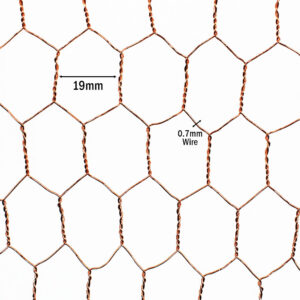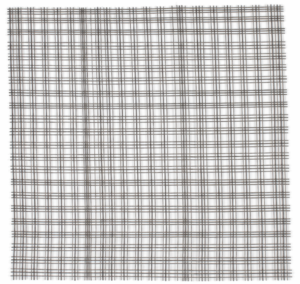








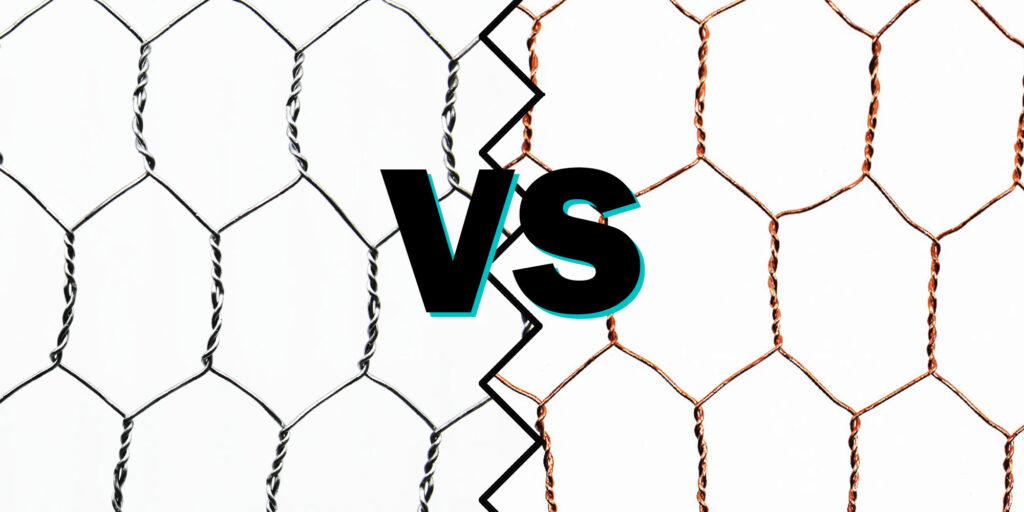
In order to achieve the perfect blend of durability, aesthetics, and affordability, homeowners and builders should choose the right chicken wire for thatched roofing.
It’s a symbol of rustic charm and traditional craftsmanship, so its roofing materials have to complement its natural beauty and last a long time. We have two contenders in this material matchup: galvanised steel and pure copper chicken wire. Each has its own advantages.
For years, galvanised steel has been the go-to option because of its strength and affordability. In contrast, pure copper chicken wire is a luxurious alternative due to its natural corrosion resistance and aesthetic appeal.
In thatched roofing, chicken wire mesh provides structural support and protects the roof from pests and the elements. A detailed comparison between these two roofing materials will follow, aiming to assist homeowners in making an informed decision.
There is more to chicken wire mesh than just a material; it plays a crucial role in ensuring thatched roofs last a long time. Traditionally used to prevent thatch from being dislodged by birds or wind, chicken wire mesh has evolved to serve a variety of roofing purposes. It helps distribute weight evenly across the roof and reduce strain on any one point. Furthermore, it prevents birds and rodents from nesting within the thatch and causing damage.
There are numerous benefits to incorporating chicken wire mesh into thatched roofing. It extends the roof’s lifespan by protecting the thatch from external wear and tear. By preserving the thatch layer, the roof remains watertight and insulating, protecting the building’s interior from moisture and temperature changes. A chicken wire mesh roof also maintains its aesthetic integrity, ensuring that it remains unblemished and consistent over time.
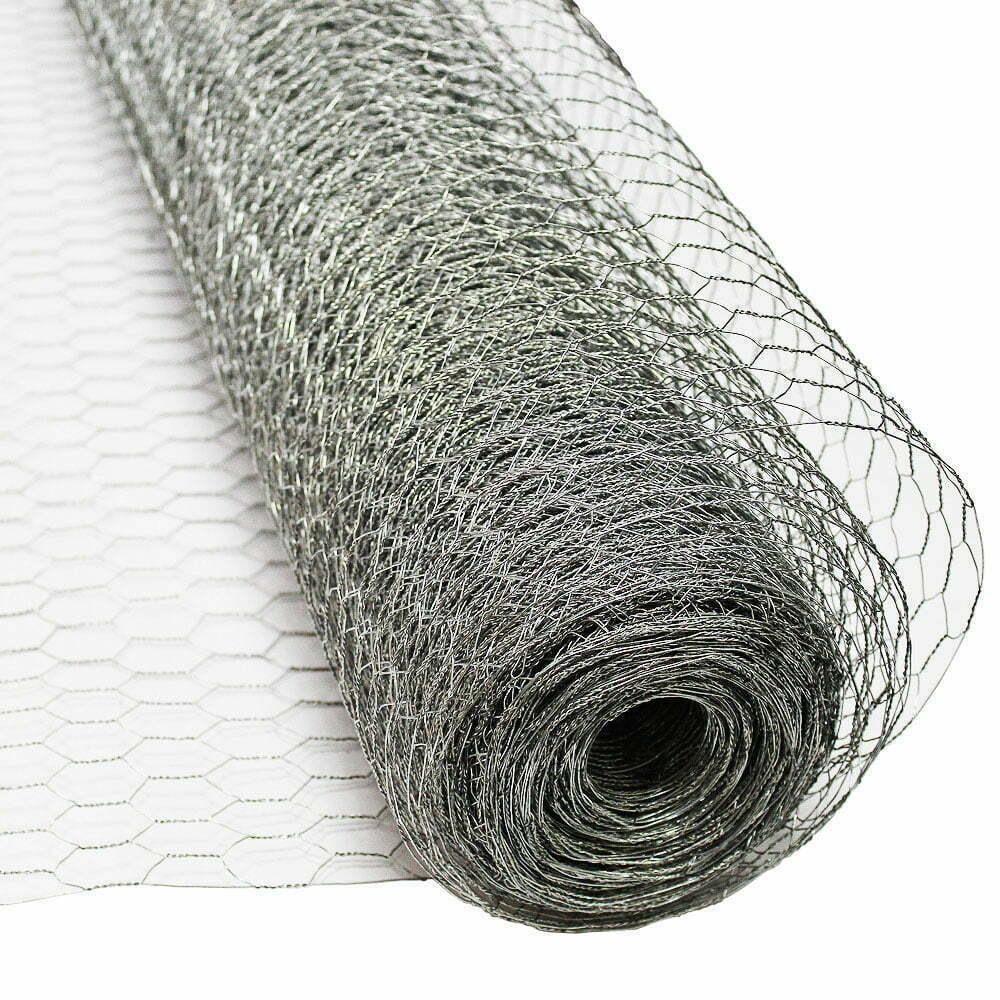
In thatched roof construction, galvanised steel chicken wire has long been a staple, praised for its durability and affordability. The zinc coating offers commendable corrosion and weathering resistance, making it an ideal choice for outdoor applications. Galvanisation protects steel from moisture and oxygen, two critical elements in the rusting process, thereby extending the lifespan of chicken wire.
A significant advantage of galvanised steel chicken wire is its longevity. Thatched roofs can be effectively protected for many years with proper installation and minimal maintenance. Additionally, its strength and rigidity make it resistant to physical damage from animals and environmental forces, adding to its appeal as a roofing material.
Despite its benefits, galvanised steel has some drawbacks as well. It is possible for the zinc coating to wear away over time, especially in environments with high salinity or acidity. When corrosion begins, it compromises the integrity of the wire, requiring repairs or replacements. Galvanised steel lacks the warmth and character of more natural materials, which can be an issue for homeowners seeking a particular look.
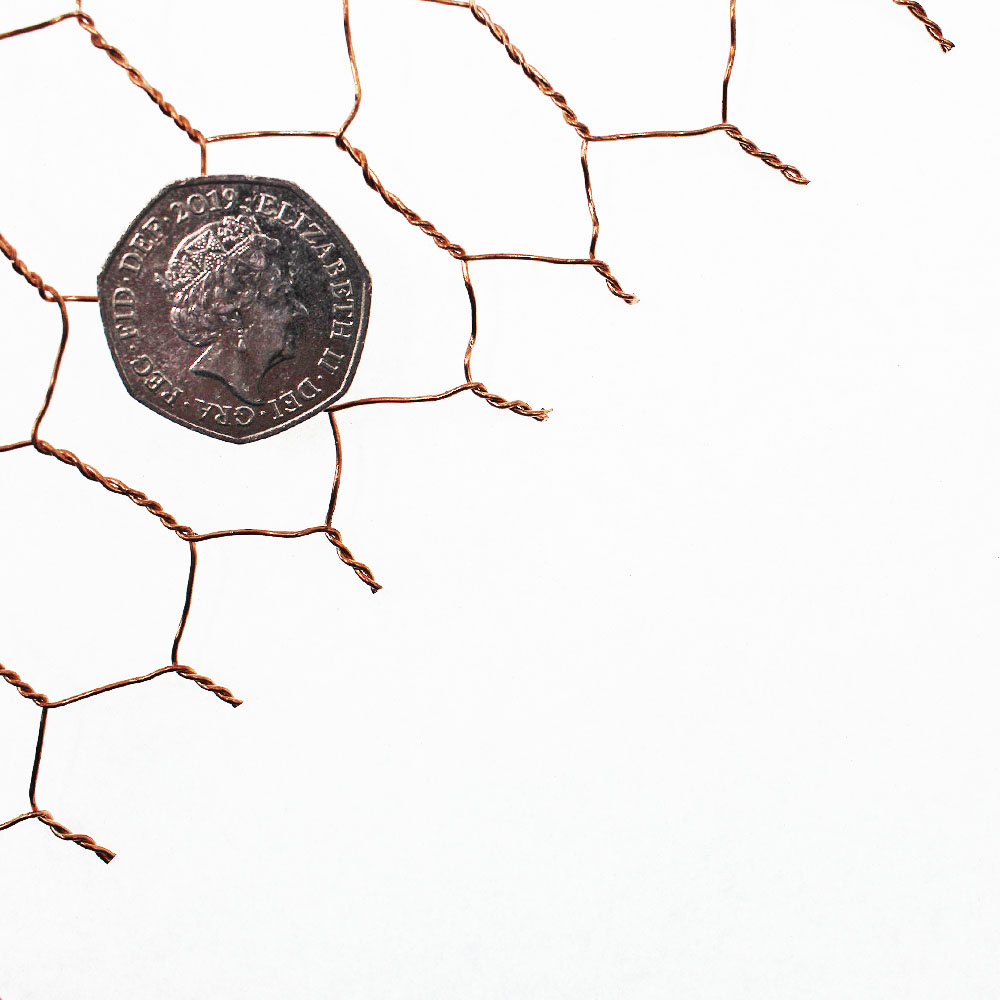
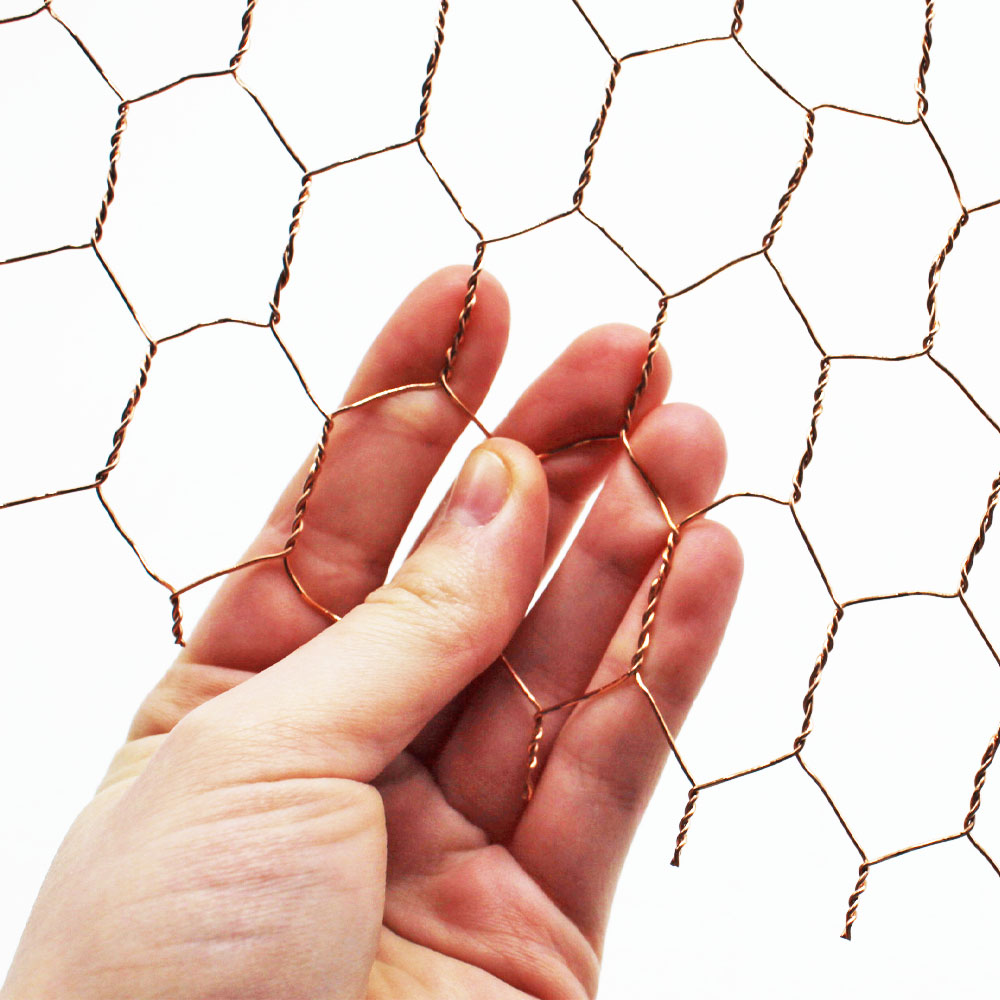
Chicken wire made from pure copper is an upscale alternative to traditional materials, bringing with it several advantages, including durability and aesthetics. The natural corrosion resistance of copper makes it able to withstand harsh weather conditions without rusting. As a result, it is an excellent choice for thatched roofing, where longevity and minimal maintenance are essential.
Copper has an undeniable aesthetic appeal. A bright metallic shine gradually weathers into a beautiful verdigris patina, adding character and elegance to the roof. Copper’s antimicrobial properties, which prevent the growth of moss and fungi, contribute to both the roof’s beauty and health.
The natural reaction of copper chicken wire to moss growth is another significant advantage of using it in thatched roofing applications. Copper exhibits inherent antimicrobial properties that go beyond corrosion resistance, inhibiting the growth of moss, algae, and other organic materials. Rainwater picks up copper ions when it comes into contact with copper. On the surface of the thatch where the copper wire is installed, these ions are toxic to moss and algae.
Due to their organic nature, thatched roofs can be prone to moss and algae accumulation due to this characteristic. In addition to detracting from the aesthetic appeal of the roof, these growths can also retain moisture, leading to deterioration of the thatch. Copper’s natural properties enable homeowners to maintain a roof’s appearance and structural integrity with minimal maintenance by incorporating pure copper chicken wire.
Copper chicken wire can also contribute to the overall health of the environment. Unlike chemical treatments that can harm adjacent plants and wildlife, copper ions are released in minute, non-toxic amounts, targeting only moss and algae.
Despite its superior qualities, pure copper chicken wire is expensive. Compared to galvanised steel, the initial investment is significantly higher, which can be a limiting factor for some projects. Additionally, copper is softer than steel, so it requires more care during installation to prevent damage. For homeowners willing to invest in quality roofing solutions, copper’s long-term benefits, including its durability, low maintenance requirements, and aesthetic contributions, make it a compelling choice.
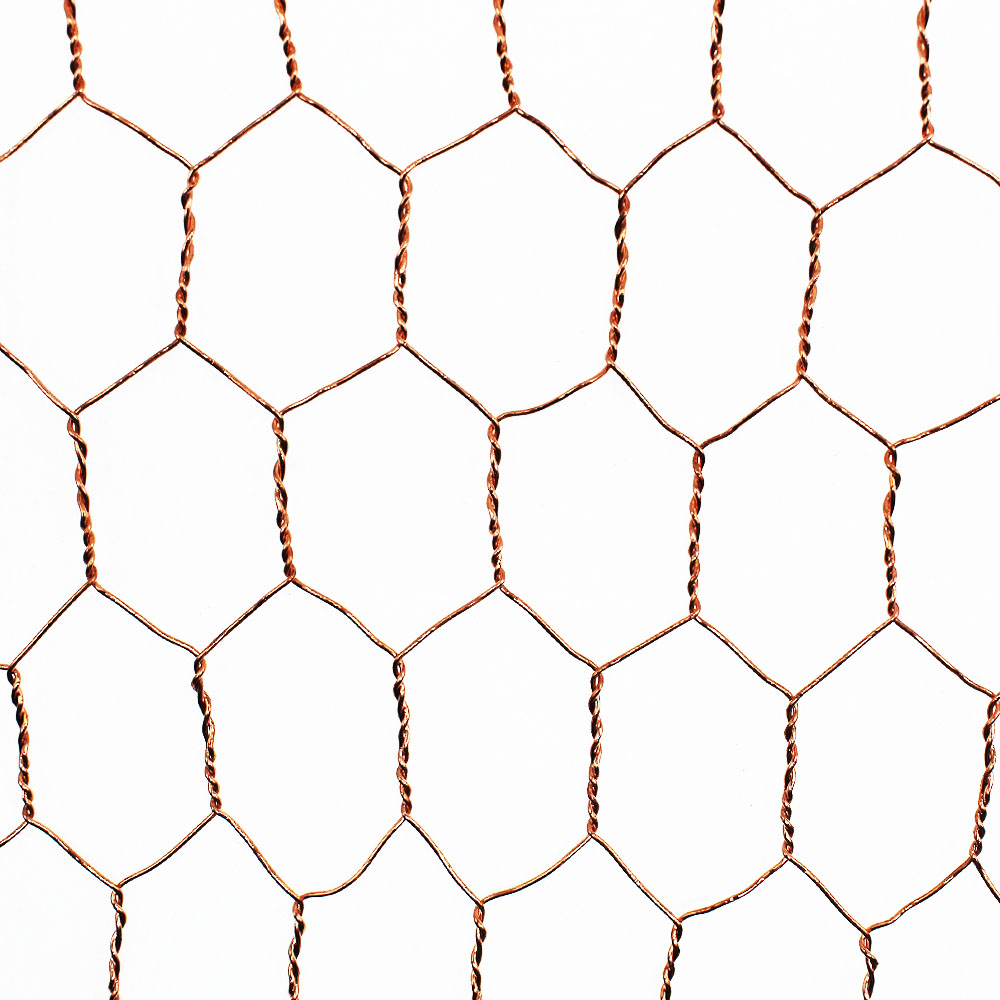
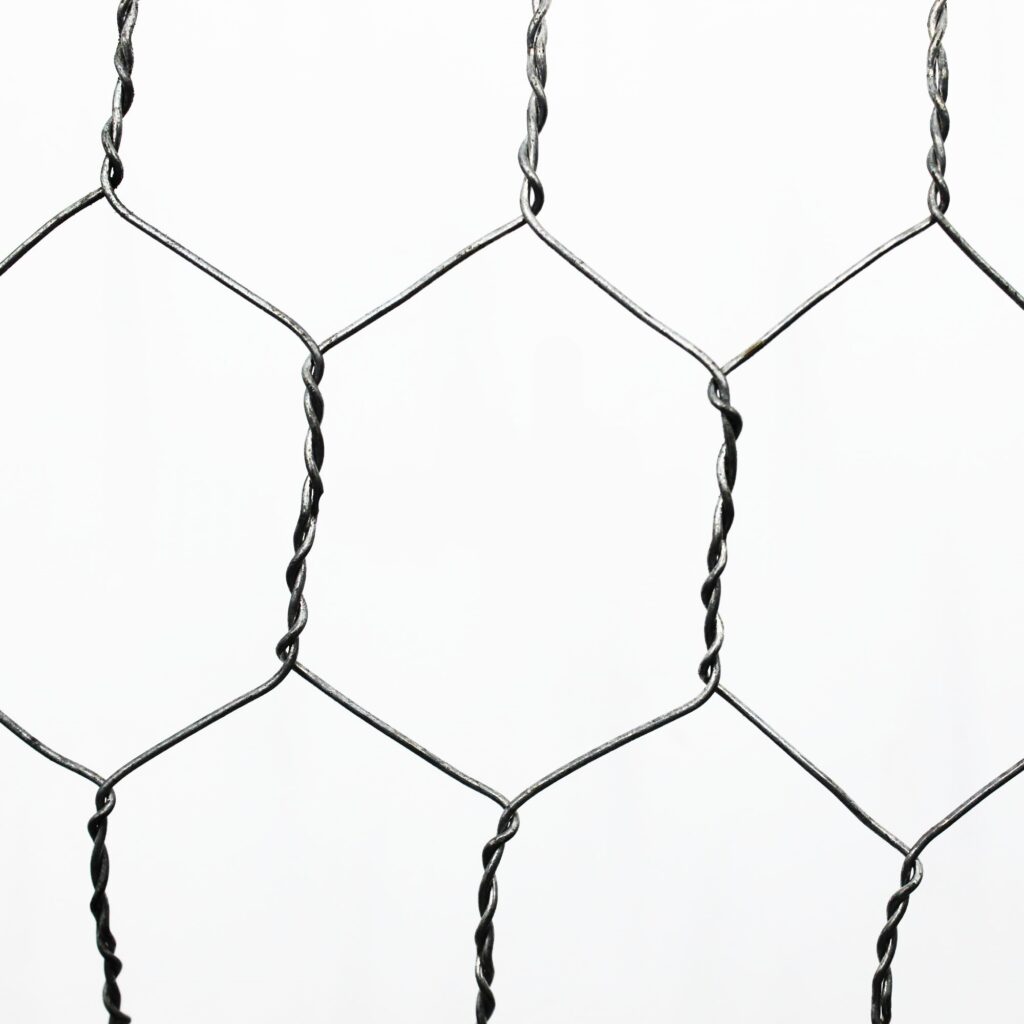
Chicken wire for thatched roofing requires a comprehensive evaluation of performance, durability, maintenance, and cost before choosing galvanised steel or pure copper. Those seeking cost-effectiveness and straightforward protection will find galvanised steel to be a practical solution due to its robustness and affordability. Zinc coating provides decent corrosion resistance, making it suitable for outdoor use. It is important to consider the aesthetic aspect and the possibility of corrosion over time, especially if the coating is damaged, before making a final decision.
Copper, on the other hand, is durable and easy to maintain, with a natural ability to resist corrosion. A verdigris patina not only enhances the material’s resistance to environmental elements, but also enhances its aesthetic appeal, blending beautifully with the surrounding natural environment. Even though copper’s upfront costs are higher, its durability and virtually maintenance-free nature offer compelling arguments for its value over time, especially in applications that require the preservation of appearance and material integrity.
For homeowners and professionals seeking a blend of performance and aesthetics in thatched roofing, copper often emerges as the superior choice for homeowners and professionals seeking both functional protection and visual harmony. For those planning for the future, copper is a wise investment due to the long-term savings on maintenance and replacements.
| Feature | Galvanised Steel | Pure Copper |
| Durability | High with protective coating | Superior, with natural corrosion resistance |
| Aesthetic Evolution | Functional appearance, risk of rust | Develops a verdigris patina, enhancing beauty |
| Maintenance | Periodic inspection and rust prevention needed | Minimal; natural patina reduces maintenance |
| Cost | More affordable upfront | Higher initial cost but may offer better value over time |
| Environmental Suitability | Suitable for most environments; caution in coastal areas | Excellent for all environments, including coastal |
| Installation | Straightforward, similar tools required | Easy handling due to malleability; careful installation to preserve finish |
Galvanised Steel:
Pure Copper:
To maximise the lifespan and effectiveness of chicken wire, proper installation is essential. To prevent sagging, the wire must be tensioned appropriately and securely attached to the roof structure. Whatever material is chosen, the objective remains the same: to protect the thatched roof while complementing its aesthetics.
Galvanised steel and pure copper chicken wire have been tested in thatched roofing, with each material displaying its own advantages and disadvantages. The robustness of galvanised steel chicken wire against wildlife damage was praised in a rural setting where it was used. Despite some surface rusting, the material maintained its structural integrity over a decade.
On the other hand, a coastal property chose pure copper chicken wire for its superior corrosion resistance and aesthetic appeal. As the copper mesh endured the salty air, it developed a stunning verdigris patina that enhanced the property’s visual appeal. According to homeowners, the material performed well and added value to their homes’ aesthetics.
In the comparison of galvanised steel and pure copper chicken wire for thatched roofing applications, there are clear differences between their advantages and applications. Economical and durable, galvanised steel is suitable for environments where aesthetic evolution is less important. Pure copper, on the other hand, is known for its durability, ease of maintenance, and aesthetic appeal, especially in settings where its natural patina is appreciated.
A balanced consideration of budget, aesthetic preferences, and environmental conditions is necessary to make an informed decision.
We hope that this article has proven to be of use. We really enjoyed putting it together.
As always, thank you for checking out our blog. We hope that this helps you with your project. We try to launch a couple of new guides every week. Eventually we will have covered everything there is to cover about mesh.
You may be interested in our blog that explores how to build a chicken coop.
Our goal for our blogs and help guides is to answer as many questions as possible to help to explain the possibilities of mesh to our customers.
